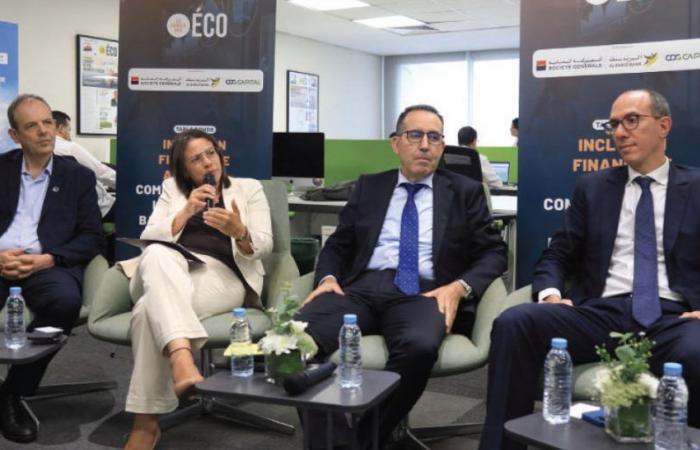As part of its cycle of meetings, the Cercle des ÉCO organized, on June 6, a round table on the theme: “How to meet the challenge of banking?”. Participants included: Mehdi Benbachir, general manager and member of the management board of Société Générale Maroc; M’Hamed El Moussaoui, general director in charge of support and technology, and member of the board of directors of Al-Barid Bank; Hakima Alami, director of the monitoring of payment systems and means and financial inclusion department at Bank Al-Maghrib; and Xavier Reille, director of the International Finance Corporation (IFC) for the Maghreb and Djibouti. The conference was moderated by Meriem Allam, publishing director of ECO Inspirations.
First diagnosis drawn up by all the panelists: financial inclusion in Morocco has made good progress. Between the last two World Bank Findex reports, it increased by 20 points. A positive step, but which must be renewed, say the speakers in unison.
Indeed, this inclusion cannot be the aim, since “the objective is to achieve economic inclusion and inclusive growth”, recalls Hakima Alami of Bank Al-Maghrib.
Despite encouraging results, “parity in financial inclusion has yet to be achieved,” underlines Mehdi Benbachir of Société Générale Maroc.
“We must intensify our efforts to achieve true financial inclusion that embraces all categories of the population, including women and young people. It is imperative to put in place specific strategies for these segments of the population,” he adds.
The good progress results can be explained in particular by the new regulation on payment institutions and banking digitalization. On the other hand, among the levers to be activated is that of microfinance, which remains under-exploited.
“Microfinance is an essential lever for reaching the most vulnerable populations and promoting their integration into the financial system,” adds M’Hamed El Moussaoui.
A forthcoming law should help support this sector, along with other alternative models, such as mobile payment and microinsurance. The key to the progress made and to those to come, banking operators emphasize, is the good understanding and partnerships established between the different players. Each brings its added value to penetrate a market that is not easily accessible.
“We must work hand in hand to create an inclusive and efficient financial ecosystem,” says Mehdi Benbachir.
The Central Bank is also working with infrastructure operators to open up rural areas. Digitalization, accelerated during the Covid crisis, was enabled by new telecoms infrastructure, technologies and the agility of economic operators.
“Technology is called upon to play an increasingly important role, the determining element of which will be the data available on customers,” says Xavier Reille.
In this area, many fintechs are preparing digital ecosystems for the banking of tomorrow, under the flexible and attentive eye of a central bank very invested in technological and regulatory monitoring.
Murtada Calamy / ECO Inspirations






